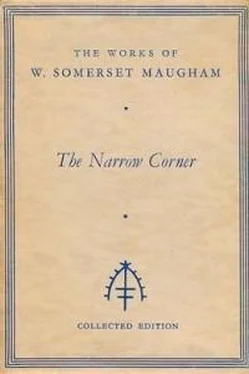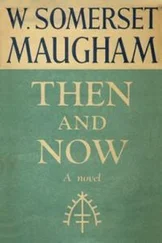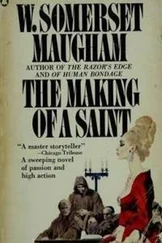“Don’t talk such rot.”
“What am I to do? Where am I to go? To–night, while that girl and I were lying in one another’s arms, I thought: why shouldn’t I marry her and settle down here? The boat’ll be damned useful. Nichols could have gone back on the same ship that you’re taking. You could have got my letter that’s waiting in Batavia. I expect it’s got a bit of money in it. Mother would have made the old man send something. I thought me and Erik, we could have gone into partnership.”
“You can’t do that, but you can still marry Louise.”
“Me?” cried Fred. “After what’s happened? I couldn’t stick the sight of her. I hope to God I never see her again. I’ll never forgive her. Never. Never.”
“What are you going to do, then?”
“God knows. I don’t. I can’t go home. I’m dead and buried in the family grave. I should like to see Sydney again, George Street, you know, and Manley Bay. I haven’t got anyone in the world now. I’m a pretty good accountant, I suppose. I can get a job as book–keeper in some store. I don’t know where to go. I’m like a lost dog.”
“If I were you the first thing I’d do is to go back to the Fenton and try and get a little sleep. You’re all in. You’ll be able to think better in the morning.”
“I can’t go back to the boat. I hate it. If you knew how often I’ve woken up in a cold sweat, with my heart beating, because those men opened the door of my cell, and I knew the rope was waiting for me! And now Erik’s lying there with half his head blown away. My God, how can I sleep?”
“Well, curl up on that chair. I’m going to bed.”
“Thanks. Go ahead. Will it disturb you if I smoke?”
“I’ll give you a little something. There’s no object in your lying awake.”
The doctor got out his hypodermic needle and gave the boy a shot of morphine. Then he put out the lamp and slipped under his mosquito curtain.
THE doctor awoke when Ah Kay brought him a cup of tea. Ah Kay drew back the mosquito curtains and raised the jalousie to let in the day. The doctor’s room looked on the garden, tangled and neglected, with its palm trees, its clumps of bananas their immense flat leaves still shining with the night, its bedraggled but splendid cassias; and the light filtered through cool and green. The doctor smoked a cigarette. Fred lay on the long chair, sleeping still, and his unlined boyish face, so calm, had an innocence in which the doctor, with a suspicion of sardonic humour, found a certain beauty.
“Shall I wake him?” asked Ah Kay.
“Not yet.”
While he slept he was at peace. He must awake to grief. An odd boy. Who would have thought that he could be so susceptible to goodness? For, though he didn’t know it, though he put what he felt in clumsy and stupid words, there was no doubt about it, what had knocked him off his feet in the Dane, what had excited his embarrassed admiration and made him feel that here was a man of a different sort, was the plain, simple goodness that shone in him with so clear and steadfast a light. You might have thought Erik a trifle absurd, you might have asked yourself uneasily whether his head were quite equal to his heart, but there was no doubt about it, he had, heaven only knew by what accident of nature, a real and simple goodness. It was specific. It was absolute. It had an æsthetic quality, and that commonplace lad, insensible to beauty in its usual forms, had been moved to ecstasy by it as a mystic might be moved by the sudden overwhelming sense of union with the Godhead. It was a queer trait that Erik had possessed.
“It leads to no good,” said the doctor, with a grim smile as he got out of bed.
He went over to the mirror and stared at himself. He looked at his grey hair all disarranged after the night and his stubble of white beard that had grown since he had shaved the day before. He bared his teeth to look at his long yellow fangs. There were heavy pouches under his eyes. His cheeks had an unsightly purple. He was seized with disgust. He wondered why it was that of all creatures man was the only one that age so hideously disfigured. It was pitiful to think that Ah Kay, with his slender ivory beauty, must become nothing but a little shrivelled, wizened Chinaman, and that Fred Blake, so slim, upright and square–shouldered, would be just a red–faced old man with a bald head and a belly. The doctor shaved and had his bath. Then he awakened Fred.
“Come along, young fellow. Ah Kay’s just gone to see about our breakfast.”
Fred opened his eyes, immediately alert, eager in his youth to welcome another day, but then, looking about him, he remembered where he was, and everything else. His face on a sudden grew sullen.
“Oh, buck up,” said the doctor impatiently. “Go and have a wash down.”
Ten minutes later they were seated at breakfast, and the doctor noticed without surprise that Fred ate with a hearty appetite. He did not talk. Dr. Saunders congratulated himself. After so disturbed a night he felt none too well. His reflections upon life, then, were acid, and he preferred to keep them to himself.
When they were finishing the manager came up to them and addressed himself to Dr. Saunders in voluble Dutch. He knew the doctor did not understand, but talked nevertheless, and his signs and gestures would have made him comprehensible even if his manner, agitated and distressed, had not made what he was saying quite clear. Dr. Saunders shrugged his shoulders. He pretended he had no notion what the half–caste was talking about, and presently, in exasperation, the little man left them.
“They’ve found out,” said the doctor.
“How?”
“I don’t know. I suppose his house–boy went in to take him his tea.”
“Isn’t there anybody who can interpret?”
“We shall hear soon enough. Don’t forget, we neither of us know anything about it.”
They relapsed into silence. A few minutes later the manager returned with a Dutch official, in a white uniform with brass buttons; he clicked his heels together, and mentioned an incomprehensible name. He spoke English with a very strong accent.
“I’m sorry to tell you that a Danish trader called Christessen has shot himself.”
“Christessen?” cried the doctor. “That tall fellow?”
He watched Fred out of the corner of his eye.
“He was found by his boys an hour ago. I am in charge of the inquiry. There can be no doubt that it is a case of suicide. Mr. van Ryk,” he motioned to the half–caste manager, “informs me that he was here last night to visit you.”
“That’s quite true.”
“How long did he stay?”
“Ten minutes or a quarter of an hour.”
“Was he sober?”
“Quite.”
“I never saw him drunk myself. Did he say anything that suggested he had the intention of doing away with himself?”
“No. He was quite cheerful. I didn’t know him very well, you know. I only arrived three days ago, and I’m waiting for the Princess Juliana .”
“Yes, I know. Then you can give no explanation of the tragedy?”
“I’m afraid not.”
“That is all I wanted to know. If I have any need of anything more from you I will let you know. Perhaps you will not mind coming to my office.” He glanced at Fred. “And this gentleman can tell us nothing?”
“Nothing,” said the doctor. “He was not here. I was playing cards with the skipper of the ketch in the harbour just now.”
“I’ve seen her. I’m sorry for the poor fellow. He was very quiet and never gave any trouble. You could not help liking him. I’m afraid it’s the old story. It’s a mistake to live alone in a place like this. They brood. They get home–sick. The heat is killing. And then one day they can’t stand it any more, and they just put a bullet through their heads. I’ve seen it before, more than once. Much better to have a little girl to live with you, and it makes hardly any difference to your expenses. Well, gentlemen, I am much obliged to you. I won’t take up any more of your time. You have not been to the Gesellschaft yet, I believe? We shall be very glad to see you there. You will find all the most important people of the island there from six or seven till nine. It is a jolly place. Quite a social centre. Well, good morning, gentlemen.”
Читать дальше
Конец ознакомительного отрывка
Купить книгу










